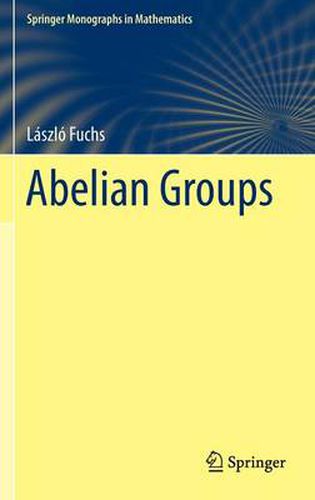Readings Newsletter
Become a Readings Member to make your shopping experience even easier.
Sign in or sign up for free!
You’re not far away from qualifying for FREE standard shipping within Australia
You’ve qualified for FREE standard shipping within Australia
The cart is loading…






This title is printed to order. This book may have been self-published. If so, we cannot guarantee the quality of the content. In the main most books will have gone through the editing process however some may not. We therefore suggest that you be aware of this before ordering this book. If in doubt check either the author or publisher’s details as we are unable to accept any returns unless they are faulty. Please contact us if you have any questions.
Written by one of the subject’s foremost experts, this book focuses on the central developments and modern methods of the advanced theory of abelian groups, while remaining accessible, as an introduction and reference, to the non-specialist. It provides a coherent source for results scattered throughout the research literature with lots of new proofs.
The presentation highlights major trends that have radically changed the modern character of the subject, in particular, the use of homological methods in the structure theory of various classes of abelian groups, and the use of advanced set-theoretical methods in the study of un decidability problems. The treatment of the latter trend includes Shelah’s seminal work on the un decidability in ZFC of Whitehead’s Problem; while the treatment of the former trend includes an extensive (but non-exhaustive) study of p-groups, torsion-free groups, mixed groups and important classes of groups arising from ring theory. To prepare the reader to tackle these topics, the book reviews the fundamentals of abelian group theory and provides some background material from category theory, set theory, topology and homological algebra.
An abundance of exercises are included to test the reader’s comprehension, and to explore noteworthy extensions and related sidelines of the main topics. A list of open problems and questions, in each chapter, invite the reader to take an active part in the subject’s further development.
$9.00 standard shipping within Australia
FREE standard shipping within Australia for orders over $100.00
Express & International shipping calculated at checkout
This title is printed to order. This book may have been self-published. If so, we cannot guarantee the quality of the content. In the main most books will have gone through the editing process however some may not. We therefore suggest that you be aware of this before ordering this book. If in doubt check either the author or publisher’s details as we are unable to accept any returns unless they are faulty. Please contact us if you have any questions.
Written by one of the subject’s foremost experts, this book focuses on the central developments and modern methods of the advanced theory of abelian groups, while remaining accessible, as an introduction and reference, to the non-specialist. It provides a coherent source for results scattered throughout the research literature with lots of new proofs.
The presentation highlights major trends that have radically changed the modern character of the subject, in particular, the use of homological methods in the structure theory of various classes of abelian groups, and the use of advanced set-theoretical methods in the study of un decidability problems. The treatment of the latter trend includes Shelah’s seminal work on the un decidability in ZFC of Whitehead’s Problem; while the treatment of the former trend includes an extensive (but non-exhaustive) study of p-groups, torsion-free groups, mixed groups and important classes of groups arising from ring theory. To prepare the reader to tackle these topics, the book reviews the fundamentals of abelian group theory and provides some background material from category theory, set theory, topology and homological algebra.
An abundance of exercises are included to test the reader’s comprehension, and to explore noteworthy extensions and related sidelines of the main topics. A list of open problems and questions, in each chapter, invite the reader to take an active part in the subject’s further development.